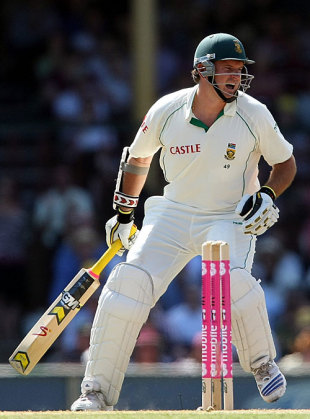The bravest man in world cricket
South Africa own the bravest man in world cricket, but having Graeme Smith was not enough to secure the most dramatic of draws
Peter English at the SCG
07-Jan-2009

| ||
South Africa own the bravest man in world cricket, but having Graeme Smith was not enough to secure the most dramatic of draws. Even Australians who wear green and gold tattoos tingled when the door to the dressing room opened and Smith walked out at No. 11, looking to survive 8.2 overs with a broken hand, his own blood recently injected into his right elbow, and a desperate Australian attack.
Having been roared to the centre, Smith tried to block out the pain, but it was there whenever he defended. Leaving was easier - the bowlers gave him opportunities - and he crept slowly towards the finish with Makhaya Ntini, a usually easy wicket proving impossible to dislodge. For 27 balls the pair leaned on each other and floated their country, but as Australia wondered if they would ever be able to knock down these South Africans they achieved their escape with 10 balls remaining.
The countdown had begun at tea when storm clouds hovered to the north of the SCG. Smith entered after a 50-run stand between Ntini and Dale Steyn as the Australians grew frantic. "Deep inside I didn't really want to get out there," Smith said. He arrived in the morning without any gear, but when he decided he was needed he found some pants in his cricket bag protecting his bats.
A shirt was borrowed from Jacques Kallis and Paul Harris' pullover was worn with a hamburger stain on it. He took off the plastic cast that had been protecting the fifth finger on his left hand and a re-modelled glove was put on instead. There were no painkillers. Morne Morkel laced up Smith's spikes. Even before his finger injury simple tasks such as
brushing his teeth were too painful. He started to pad up when Ntini went out to bat and the target had shrunk to 50 deliveries when he took guard.
"I just decided to give it my best shot," he said. "If I got a first-baller, at least I tried, that was what was going through my head. There was a lot of pain, I'd just had injections in my elbow and this [his hand] is obviously not very friendly at the moment, but I was grateful I never got another knock on either part of my body." His left hand was so tender he could not glove tap with Ntini.
Most balls hit the bat, but Smith was unfortunate to make two mistakes. He didn't take two when he glanced Nathan Hauritz to fine leg. Another run was there, but by collecting only one it left him facing Mitchell Johnson at the most difficult end in the following over. Playing back hurt Smith's hand a lot more than when he had to go forward and with the second delivery of the second last over, he left a gap and Johnson's delivery cut
in off a big crack and slipped through to the stumps.
"It probably would have got me if I had both arms available," he said. The South Africans exhaled and Smith slowly walked up to Ntini and hugged him like a brother. Two strong-willed men had fallen less than two overs short. The Australians were in a huddle, but they soon moved over to congratulate the batsmen. Ricky Ponting said the traits Smith displayed were what everyone looks for in a leader. They were also in awe of Smith, who carries the square jaw and courage of a superhero.
While Smith was standing in the middle, taking 17 balls over 3, it was easy to recall some of the other acts of bravery to support the team's cause. Ken Mackay taking the final ball from Wes Hall in the chest to draw the 1960-61 Adelaide Test, Rick McCosker batting with a broken jaw in the Centenary Test, and Malcolm Marshall taking 7 for 22 at Old Trafford in 1988 with a fractured hand.
Smith was disappointed by this result, but the main prize had already been won, and he left with the trophy as well as the award for Man of the Series. Throughout the three Tests he was inspirational and influential, grimacing through the pain of his elbow but staying in Australia until the end. It was appropriate that he was involved in the last act of a series he said was the best he had been part of. He was the most memorable actor in an absorbing contest and his heroics will not be forgotten easily.
Peter English is the Australasia editor of Cricinfo